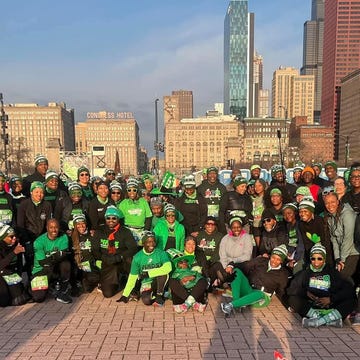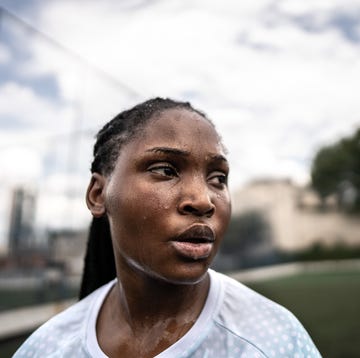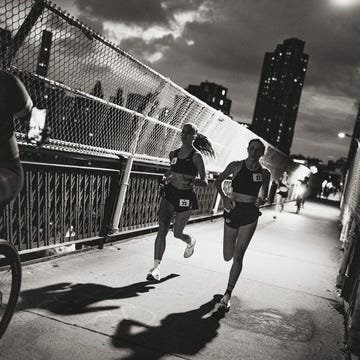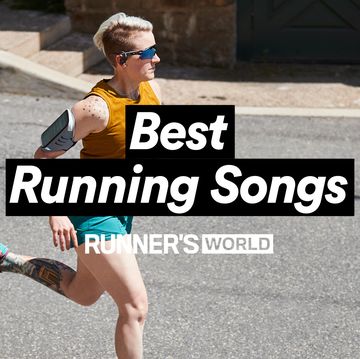For years, Cindy Quiroz struggled to maintain a consistent running routine. Though the bilingual school teacher played soccer in high school, running long distances wasn’t much fun compared to sprinting after a ball. Into adulthood, the Brooklyn native tried to go for runs with friends, but she never stuck with it long enough to establish a regular practice.
When a friend moved to Philadelphia in 2022, Quiroz decided to commit to her first training cycle when she signed up for the Philadelphia Half Marathon. She knew being part of a community of runners would help motivate her, so she searched for local groups on social media. Scrolling through running hashtags, Quiroz came across Women Make Moves (WMM), a women-led running group focused on empowering women to grow in the sport and beyond. She sent a message to founder Tammy Salazar-Andurand, who invited her to join their weekly Thursday night run.
Being Quiroz’s first community run, she wasn’t sure what to expect when she arrived to meet them at Urban Asanas, a Black woman-owned yoga studio in Crown Heights. But the group’s icebreaker immediately put her at ease.
At the start of every run, Salazar-Andurand asks newcomers to share their name and astrological sign, which is how Quiroz met her now good friend who shares the same birthday. That day, the group ran to the OY/YO sign at the Brooklyn Museum and stopped to take a picture. Being new, Quiroz offered to take the photo, but they insisted she be in the shot.
“Looking back at that photo, I’m so happy I was in the picture,” Quiroz told Runner’s World. “That moment of my first run with them is there forever.”
Three years later, Quiroz is now a WMM pace captain who has completed three marathons—efforts she credits to those in the group for believing in her and making the sport fun and fulfilling.
Amplifying Women Through Running
When Salazar-Andurand started WMM in 2022, the RRCA-certified run coach wanted to create a space that celebrated women and prioritized their safety. After noticing how many New York City-based run crews failed to show lasting support to women beyond Women’s History Month, Salazar-Andurand sought to form a club that not only recognized women’s running accomplishments, but also their accolades outside of the sport year-round.
“I came up with the name Women Make Moves because I wanted a name that encompasses movement, but also what you accomplish being a woman,” Salazar-Andurand said, while explaining that the pre-run icebreakers also include time to celebrate individual accomplishments, like writing a book, getting a promotion, or something as simple as showing up on a tough day. This support is also seen on the crew’s Instagram page with “women crush Wednesdays,” a weekly post that highlights a different member each week.
“We celebrate you in miles and beyond,” Salazar-Andurand said. “And it’s really cool as a leader to see the type of people that come into the crew. We have a huge pool of talent—singers, songwriters, artists, entrepreneurs, people starting their own businesses. We shout people out for all that stuff.”
After hearing stories of women getting left behind on runs with groups who claimed to be inclusive of all paces, Salazar-Andurand also wanted to ensure members would never run alone. So, she enlisted the help of pace captains ranging from the lead pack to a walking group, or “sexy pace,” as they like to call it.
The first run took place on March 10, 2022—the same week as International Women’s Day—with 10 members who ran to a Frida Kahlo mural. Though the 5K to 4-mile routes vary, Salazar-Andurand maps out each run as an homage to women leaders and artists. Oftentimes, they’ll end their runs at a local women-owned business where they socialize together afterward. In the last three years, the group’s numbers have since increased to 50-plus runners each week and even expanded with a second chapter.
Spreading the Word
In 2021, Salazar-Andurand met Harkiran Kalsi virtually during the pandemic through a global female running collective. Kalsi, a London-based graphic artist, designed the WMM logo. When she came to Brooklyn and experienced a WMM run in person, Kalsi knew she had to create a similar community in London.
Last summer, Kalsi and a handful of friends ran to a Black and Palestinian-owned bakery that had just opened up in London. During the run, one of Kalsi’s friends suggested they create an accessible space for more women to run together.
As Kalsi described, many London-based running groups meet for long runs on Sundays, but the miles are often run at a faster pace, leading a lot of runners to feel left out. In contrast, they wanted to create a crew that’s free of judgement, where women would feel welcome running at any pace. With many mutual friends traveling from London to New York and vice versa, Kalsi thought they could create another WMM group in her hometown.
“I contacted Tammy and was like, how would you feel if we had a Women Make Moves group in London? And she was like, ‘Oh my God, that’s absolutely my dream,’” Kalsi said, while explaining that the London chapter also supports local women-owned businesses and LGBTQ+ communities. “We’re trying to do little things where we make sure women are seen, their backgrounds are seen, they’re not forgotten, and they’re safe in our presence.”
Though the London group is still relatively new, Kalsi has already received positive feedback from members. One runner, who needed to walk at one point during their weekly 5K, noted it was the first time she didn’t feel like she needed to apologize for slowing down. Another told Kalsi she wore shorts for the first time ever because she felt safe running with them. “Those moments show the barriers stopping women. I want to find out [the barriers], and then make it comfortable for them,” Kalsi said.
In April, the two groups met in person for the first time at the London Marathon, where six members, including Quiroz, came together to race the World Marathon Major.
Those who didn’t race made a cheer station at mile 15 with encouraging messages written in chalk on the course. For Salazar-Andurand, meeting the London cohort, and hearing about the same needs for safety around women, helped reinforce the work they’re doing and the need to keep going.
“It makes me feel like what we’re bringing to the table is so important because we want to have that space where women can feel like, I can go run. It doesn’t matter what I look like, or what my pace is,” Salazar-Andurand said. “That’s more important now than ever.”
Taylor Dutch is a writer and editor living in Austin, Texas, and a former NCAA track athlete who specializes in fitness, wellness, and endurance sports coverage. Her work has appeared in Runner’s World, SELF, Bicycling, Outside, and Podium Runner.















